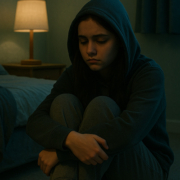Is It Teen Depression? Or Boredom?
Sometimes teens mistake boredom for depression. The two can look surprisingly similar on the surface. It’s a really common issue, especially with how overstimulating and fast-paced their digital world is. For parents in St. George, Utah, distinguishing between teenage boredom and clinical depression can be difficult. At Clear View Counseling, we specialize in adolescent therapy that helps uncover the root of emotional challenges and provide the support teen girls need to thrive. Understanding the difference is the first step toward helping your teen feel heard, supported, and empowered.
Here’s a breakdown of how this confusion happens and why it matters:
Sometimes, teens say they feel “depressed” when what they’re really feeling is just plain bored—but honestly, who can blame them? In a world where everything moves at TikTok speed, even five quiet minutes can feel like emotional doom. When your brain is used to a constant feed of funny videos, group chats, and aesthetic snack boards, anything less can feel suspiciously like sadness. That “ugh” feeling when nothing sounds fun or interesting? That’s often boredom in disguise. The tricky part is, boredom and depression can wear the same hoodie: low energy, lack of motivation, and that overall “blah” vibe. But here’s the thing—if those feelings don’t go away, if they stick around for weeks, mess with your sleep, appetite, or how you feel about yourself, it might actually be depression. And if that’s the case, therapy isn’t just helpful—it’s important. Because while boredom might need a change of pace, depression needs real support.
So, how can you tell the difference between the two?
| Boredom | Depression |
|---|---|
| 😐 Temporary – Usually passes once you’re engaged in something interesting. | 😔 Persistent – Lasts for at least two weeks or more, often longer. |
| 🧠 Caused by lack of stimulation – “There’s nothing to do.” | 💭 Caused by deeper emotional pain, stress, trauma, or brain chemistry. |
| 🎮 Goes away with activity – Hanging out with friends or doing something fun usually helps. | 📉 Hard to shake – Even things you normally enjoy don’t feel good anymore. |
| 😤 Feels like restlessness or frustration. | 😞 Feels like sadness, emptiness, or hopelessness. |
| ⏰ Linked to the moment – Like being stuck in a boring class or having too much free time. | 🕳️ Feels ongoing, like it’s hanging over everything you do. |
| 💡 You still have energy—you’re just not sure what to do with it. | 💤 Often includes low energy, exhaustion, or trouble even getting out of bed. |
| 🍕 Appetite and sleep are usually normal. | 🌙 Often includes changes in sleep (too much or too little) and eating habits. |
| 🤷 “I’m bored” is the vibe—you want something to do. | 🙁 “I don’t care” is the vibe—you feel numb or emotionally stuck. |
How can parents talk to their teens about this topic? The key for parents is to come in calm, curious, and without judgment. Here are some tips and examples to help open the door:
1. Pick a relaxed moment
Avoid starting the conversation during an argument or when emotions are already high. Try during a car ride, while cooking together, or while doing something low-pressure.
Try saying:
“Hey, I’ve been reading about how a lot of teens feel ‘blah’ or say they’re depressed, but sometimes it’s actually boredom. Have you ever felt that way?”
2. Be curious, not confrontational
Use open-ended questions. The goal is to understand, not diagnose or fix right away.
Try saying:
“When you say you feel down or unmotivated, what does that feel like for you?”
“What do you think helps when you feel like that?”
3. Normalize the experience
Let them know they’re not alone and that it’s totally okay to talk about emotions—even confusing ones.
Try saying:
“I remember feeling like that as a teen too. Sometimes I couldn’t tell if I was sad or just stuck.”
4. Offer support without pressure
Instead of jumping to solutions, let them know you’re there for them—whether it’s boredom, depression, or something in between.
Try saying:
“I’m here to help figure it out with you, whether that’s finding something new to do or talking to someone if it feels heavier than that.”
5. Keep the door open
Even if they don’t want to talk right away, just knowing the door is open makes a difference.
Try saying:
“You don’t have to have all the answers right now. I just want you to know you can talk to me anytime.”
If your teen is struggling and you’re unsure whether it’s boredom or something deeper, you’re not alone. At Clear View Counseling in St. George, Utah, we specialize in supporting teen girls through the challenges of adolescence, including anxiety, depression, and emotional overwhelm. Therapy provides a safe, nonjudgmental space for teens to explore their feelings, build resilience, and develop healthy coping strategies. If you’re in Southern Utah and seeking compassionate, evidence-based counseling for your teen, we’re here to help. Reach out today to learn more about how we can support your family.

